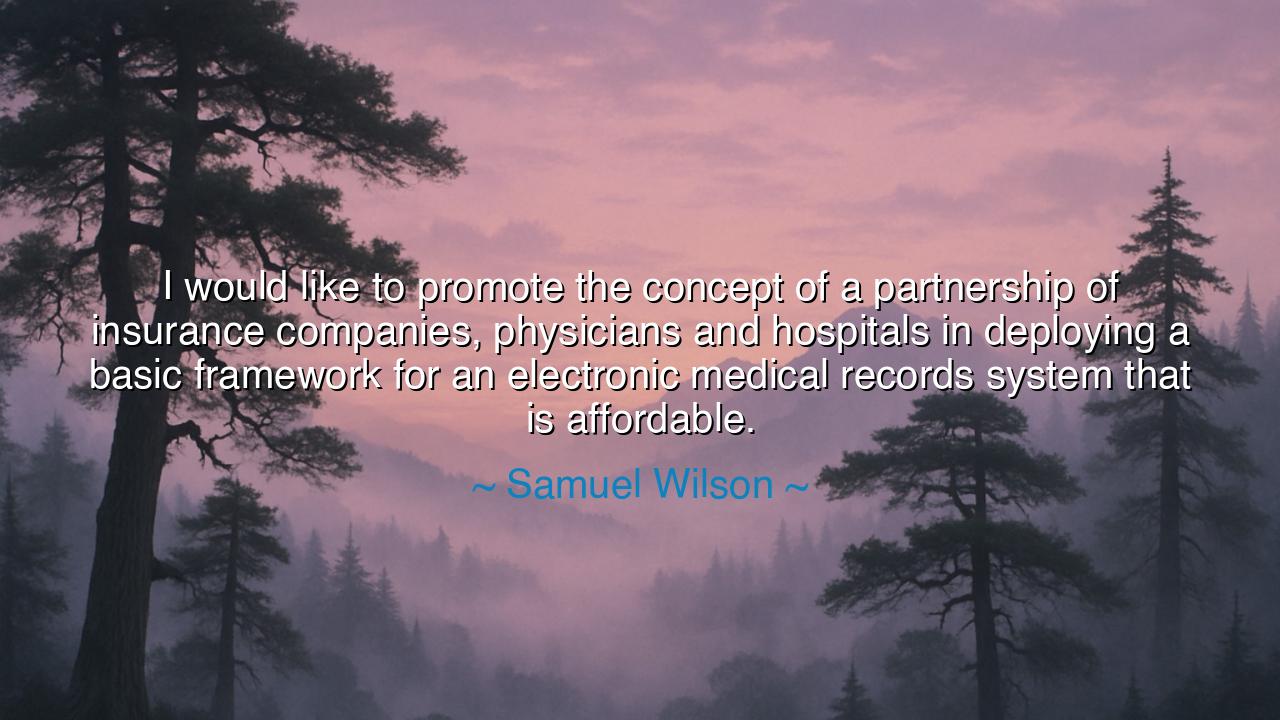
I would like to promote the concept of a partnership of insurance
I would like to promote the concept of a partnership of insurance companies, physicians and hospitals in deploying a basic framework for an electronic medical records system that is affordable.






In the grand tapestry of human civilization, the health of a society is one of its greatest treasures, and the ways we manage and protect that health are a reflection of our wisdom and responsibility. Samuel Wilson’s words, "I would like to promote the concept of a partnership of insurance companies, physicians, and hospitals in deploying a basic framework for an electronic medical records system that is affordable," speak to a profound truth: that in the complex world of healthcare, collaboration between all parties involved is the key to creating a system that serves the common good. This vision calls for unity, where the needs of the individual are balanced with the resources and expertise of the collective.
In ancient times, the greatest healers were not just those with the most knowledge, but those who could integrate the wisdom of many disciplines into one harmonious approach. Hippocrates, regarded as the father of medicine, believed that healing was a balance of the physical, mental, and social aspects of the individual. He taught that medicine was not just a practice for the individual physician but was part of a broader community effort. Similarly, Wilson's call for a partnership between insurance, physicians, and hospitals emphasizes that the solution to healthcare problems is not in isolated action but in collective responsibility. It is not enough for one entity to act alone; it is through cooperation that true healing can occur.
The example of ancient Rome provides an early testament to the importance of a systemic approach to health. The Romans, despite their military might, recognized the value of a strong infrastructure to maintain the health of their citizens. They built public baths, developed public health systems, and ensured that the sick had access to care. While their methods may seem primitive by modern standards, their approach of organizing resources for the benefit of the community laid the groundwork for how we should think about healthcare today. Wilson's desire to create a framework for an electronic medical system is not a far cry from the Romans' vision of a connected, well-organized healthcare system that can serve all citizens.
As society progresses and technology advances, the need for integration becomes ever clearer. In today’s world, the introduction of an electronic medical records system is a revolutionary shift that promises to bring efficiency and accessibility to healthcare in ways previously unimagined. Yet, this vision is not something that can be achieved through the actions of any one party. It requires the cooperation of insurance companies, who manage the financial resources, physicians, who provide the care, and hospitals, which are the institutions where care is delivered. Wilson’s words remind us that in this age of technology, the true power lies in partnership, where all hands join together to ensure that no one is left behind.
The call for affordability is also a key element of Wilson’s vision. In the ancient world, it was often the wealthy who had access to the best healers and medicines, while the poor were left to suffer in silence. Ancient Athens, for example, had a thriving medical community, but only those with means could afford the services of the best physicians. Wilson's desire for an affordable system, one that serves all people regardless of their economic status, echoes the wisdom of those who came before us. True healthcare reform is not just about improving care; it is about ensuring that the benefits of that care are accessible to all members of society, not just the privileged few.
The story of Florence Nightingale, who revolutionized nursing during the Crimean War, provides another powerful example of how partnerships can transform healthcare. Nightingale worked tirelessly to improve the conditions of military hospitals, but she also recognized that true change required the cooperation of not just nurses, but also physicians, military leaders, and the government. Her advocacy for sanitation, nutrition, and care laid the foundation for modern public health practices and emphasized the need for a collaborative approach to solving health crises. Wilson's vision for a collaborative framework for healthcare mirrors Nightingale’s recognition that systemic change can only occur when all stakeholders work together.
The lesson here is clear: collaboration and integration are the keys to achieving a healthcare system that serves all people. Whether in ancient civilizations or in modern times, true progress in healthcare is made when individuals, institutions, and systems work together in harmony. Wilson’s call for a partnership in the creation of an affordable electronic medical records system is not just a technological solution, but a philosophical one—a call to unite for the common good. We must all be willing to play our part, whether we are in positions of authority, healthcare providers, or citizens, to ensure that no one is left behind.
In your own life, think about how you can contribute to the collaboration and integration of resources for the greater good. Whether you are part of a team, a community, or a nation, your efforts, combined with those of others, can create lasting change. Just as Hippocrates and Nightingale demonstrated, our highest calling is to ensure that the health and well-being of all people are prioritized, and that the systems we create reflect the values of compassion, cooperation, and justice. Let us, therefore, strive to build a world where healthcare is accessible, efficient, and affordable, a system that serves the needs of all people and is guided by the principles of partnership and shared responsibility.






AAdministratorAdministrator
Welcome, honored guests. Please leave a comment, we will respond soon